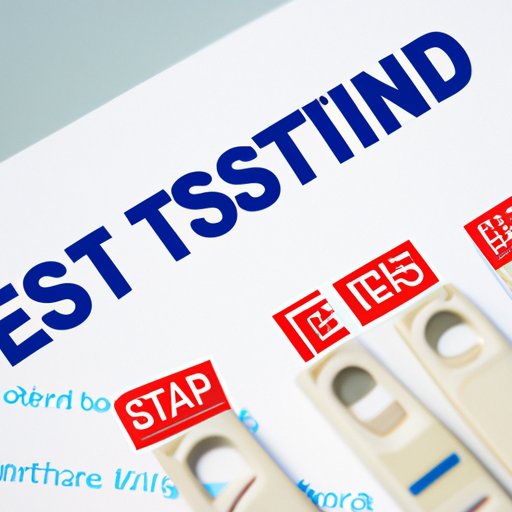
Introduction
Getting tested for STDs (sexually transmitted diseases) is crucial for anyone who is sexually active. It’s important to stay informed and take responsible measures to protect your health and the health of your partners. In this article, we will provide a comprehensive guide on where and how to get tested for STDs, as well as the importance of STD testing and affordable options available.
A Step-by-Step Guide on How and Where to Get Tested for STDs
STD testing can be done at various facilities, including clinics, hospitals, and private labs. You can start by visiting your primary care physician or gynecologist and request a screening. They may provide the tests right in their office or refer you to a specialist. Some health insurance plans may cover the costs of STD testing, so it’s important to check with your provider.
Another option is to go to a local clinic or hospital, including women’s centers, community health centers, or public health agencies. Many of these facilities offer free or low-cost STD testing, depending on your income and insurance status. Getting tested is often a quick and confidential process that typically involves a blood or urine sample, or a swab of your genitals or mouth. Your doctor or nurse may also ask you questions about your sexual history or symptoms in order to better assess your risk of infection.
Breaking Down the Stigma: Why Getting Tested for STDs is Important and Where to Go
Ignoring STD symptoms or failing to get tested on a regular basis can have serious health consequences. STDs can cause infertility, chronic illnesses, and increase the risk of contracting other infections, including HIV. In some cases, they may be asymptomatic, leading to undiagnosed infections that can be unknowingly spread to others. Getting tested regularly enables you to detect and treat infections early, which can help prevent complications and spread of the disease.
Unfortunately, there is often a stigma or shame associated with STD testing, which can discourage people from seeking help or disclosing their sexual history to their partners. It’s important to remember that getting tested is a responsible and brave act that shows you care about your own health and the well-being of those around you. There are many reputable clinics and hospitals that offer confidential STD testing, counseling and treatment, such as Planned Parenthood, community health centers, and sexual health clinics.
Affordable Ways to Get Tested for STDs
STD testing can be expensive, especially if you don’t have good insurance coverage. However, there are several affordable options available for those on a budget. Free STD testing may be available at local public health clinics and other community-based organizations. Some clinics offer sliding scale fees to those who qualify, and may not require insurance or identification. Planned Parenthood centers also provide low-cost or no-cost STD testing for men and women.
The Importance of STD Testing and the Role of Online Testing Services
Online STD testing services are a newer option that offers more convenience and discretion to those who need it. These services allow you to order a test online, have it delivered to your home, perform the test in privacy, and mail back your sample to a certified lab for analysis. Typically, you will receive your results within a few days via phone, email, or through the website portal. These services are a good option for those who cannot or do not wish to visit a physical testing facility for any reason. Popular online STD testing providers include STDcheck, LetsGetChecked, and myLAB Box.
Local STD Testing Resources and Their Benefits
There are many benefits to getting tested for STDs at local healthcare providers or clinics. These include more personalized care, access to counseling and treatment, and community resources. A local clinic may have specialized services for certain populations, such as LGBTQ+ individuals or teens, and may offer additional support like prevention education, contraception, or referrals to outside resources. It’s important to research and compare different options in your area, and choose a provider that is reputable, experienced, and responsive to your needs.
Conclusion
Getting tested for STDs is a critical part of maintaining your sexual health. By being proactive, well-informed, and open-minded, you can protect yourself and your partners from infections, complications, and negative health outcomes. We’ve covered different facilities, testing processes, and affordable alternatives to help you make informed decisions about STD testing. We hope this guide has been useful and encourage you to take control of your health and seek care when needed.





